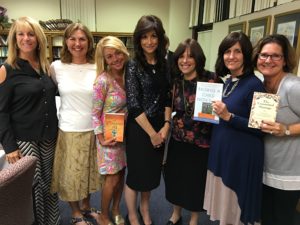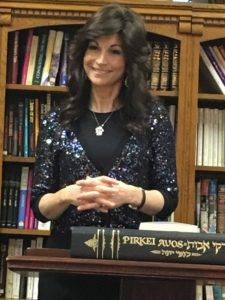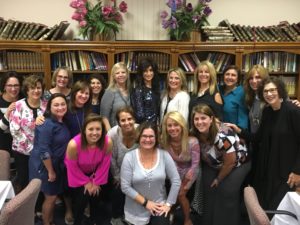Three Gifts I Learned at Rosh Hashanah
Rosh Hashanah, translated in Hebrew as “head of the year,†is a time to let go. As a new Empty Nester, letting go seems to be the theme of everything these days. We let go of our mistakes from the previous year, let go of shame we may be feeling, let go of sorrow for hurting someone, and, of course, ask for their forgiveness.
The Jewish New Year is also a celebrated time for new beginnings…a new school year, a new relationship with others, a new commitment to better ourselves, and a reawakening of Judaism and the Almighty.
Rosh Hashanah, like any Jewish holiday, is a time to learn something new, and I recently learned words of wisdom from an inspirational speaker who shared her unforgettable stories with us at Aish HaTorah St. Louis. Her name is Slovie Jungreis Wolff, a widely acclaimed teacher, writer, and the author of Raising A Child With A Soul. Slovie gives lectures on relationships, marriage, and parenting throughout the United States, Canada, Mexico, Panama, and South Africa. What she is most proud of is being the daughter of the late Rebbetzin Esther Jungreis, a survivor of the Holocaust, a devoted wife, mother of four, beloved Bubbe, and author of multiple books, including Jewish Soul on Fire, The Committed Life: Principles of Good Living from Our Timeless Past, The Committed Marriage, and Life is a Test.
Standing about five foot tall with heels (think Dr. Ruth Westheimer) with microphone in hand or soft-spoken words, her firecracker mother was someone everyone looked up to. She was admired by all walks of life and saw the potential in every single person, whether she was leading the Orthodox Hineni movement in front of  thousands in Madison Square Garden, or connecting one-on-one with a gravely burned Israeli soldier in a hospital, or giving hope to a Jewish women in a prison who gave the Rebettzin a note scribbled “God Forgive Meâ€to insert in the wall of the Kotel, or inviting trick-or-treaters in her own Brooklyn neighborhood to come back to her house for a Purim party, or hugging  a homeless person who hadn’t showered for weeks, or giving Slovie yet another Bracha every time her daughter walked out the door. Born in Hungary in 1936 (she died in August 2016 at age 80), Esther’s love for Orthodox Judaism was contagious and now her daughter Slovie carries that flame to ignite the same passion within all of us.
So, that night at Aish Slovie shared three gifts that she learned from her mother, and these words will guide me for the coming year.
1. BE PROUD TO BE A JEW. Wear your Judaism with pride. “My mother survived the physical side of the Holocaust, but she was more afraid of the spiritual holocaust happening when she returned home to the United States. This was her lifelong commitment to bring people together and get them excited about Judaism, doing the rituals, celebrating the holidays, and she never gave up on anyone. When my mother was asked to write a column for the Jewish Press, she insisted on calling it the ‘Rebbetzin’s Viewpoint’ and wanted everyone, especially young girls, to know that being a Rebbetzin was awesome!â€
As a young girl, Esther survived the Bergen-Belsen concentration camp in Germany, and many years later when she married and had children of her own she would often share bedtime stories about her past with her family. These stories were not meant to be scary or horrifying, her mother’s first hand experience in the Holocaust taught Slovie and her siblings about faith, hope, and strength. For example, she recalled a riveting story about when her mother was a small child and braved the freezing snow, covered in lice, sores, and always hungry. Before her stood a Nazi prison guard who wore a wool coat with a fur collar, warm boots, and had a full belly. Not once, as her family and other Jews were dying all around her, did she ever want to be the daughter of a Nazi. She was proud to belong to her Bubbe and Zedde.
Her mother also told the story about when a Shofar was smuggled into the camp, hidden among 300 cigarettes. On Rosh Hashanah, when the Jewish prisoners heard the Shofar, they stopped dead in their tracks to listen to the cries of the Ram’s horn and honor their holiday even when it meant risking their own lives. Many Jews were shot dead on the spot because they stopped working for a moment to take in the sounds, while others somehow survived which is a miracle. The other miracle is how that original Shofar survived and made it’s way back to Slovie from a stranger who delivered it to her at her mother’s Shiva. So the lesson here is never take being a Jew for granted. Today we don’t hide, we are free to walk into any synagogue and pray. And on Rosh Hashanah, when we listen to one long, straight blast of Tekiah, three medium wailing sounds of Shevarim, and the nine quick blasts of Teruah, we will remember our ancestors before us and the Jewish people who sacrificed their lives so that we can carry the torch and keep the fire of Judaism alive.
2. BE A GIFT OF LIGHT AND LIFE. “My father lost all his relatives in the Holocaust. He could have been a very dark, depressed person, but he was happy all the time. He loved his family, and he loved being Jewish, and that was carried down to us,†said Slovie. Her mother told a story about when she was a little girl in the Holocaust, it was her job to smile, to light up the world, to give people hope and positive energy. Years later, when her mother would light the Shabbos candles, there was always a single candlestick holder by itself, to remind them to be a light in this world, never be a source of darkness. “My parents taught us to never let the fire go out, never give up on ourselves, our family, our souls.â€
3. WHEN WE DO A MITZVAH, DO IT RIGHT. “Be happy when we go to synagogue or give a sermon or prepare for a Passover Seder. Yes, it’s a lot of work, but there is also joy, so embrace the mitzvah with joy in our heart,†said Slovie. “I remember when my son was born we had a Shabbat Bris, and I was so tired, and overwhelmed and stressed after just having a baby and now all these people are coming to my house for Shabbat, and I have all this cooking to do. It turned out to be a blessing to be surrounded by family because it was the last Shabbat my father was at my house before he died.†Slovie reminds us to smile even when we don’t feel like it because Hashem will give us a reason to smile.
L’Shana Tovah—May the sweet New Year bring you hope, peace, and joy!




